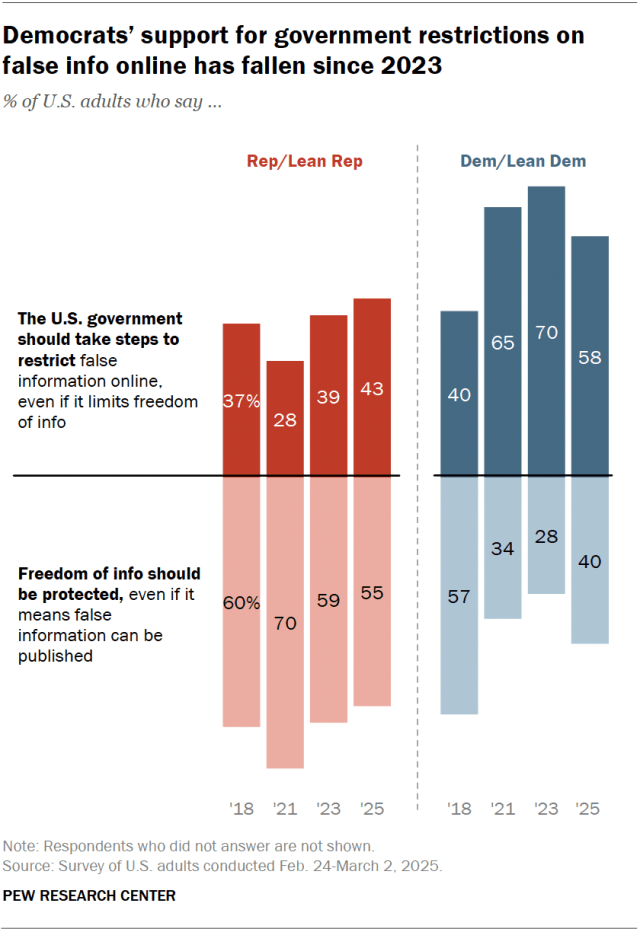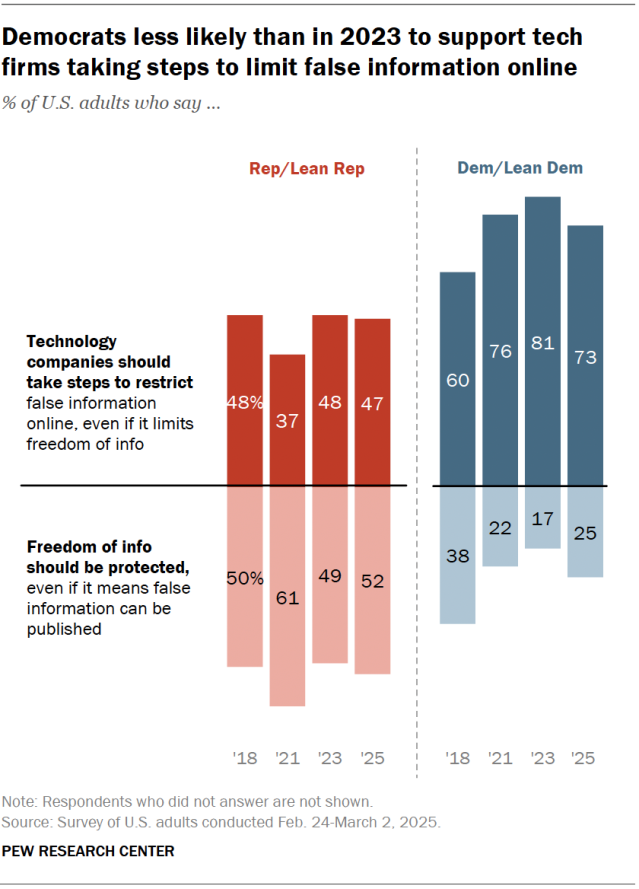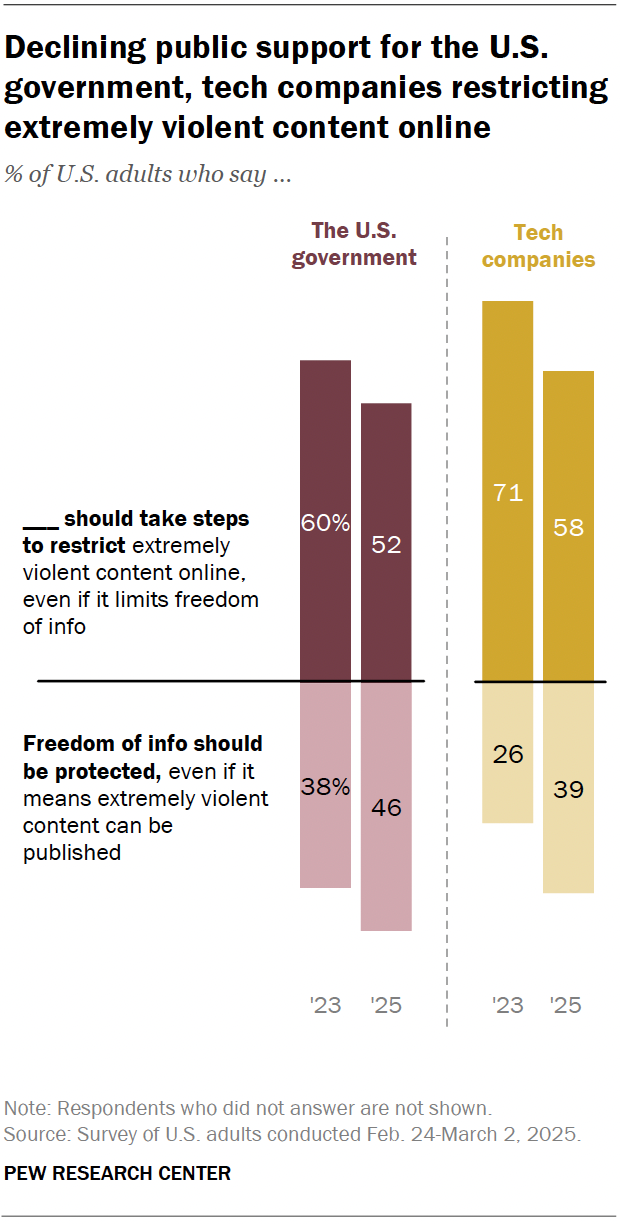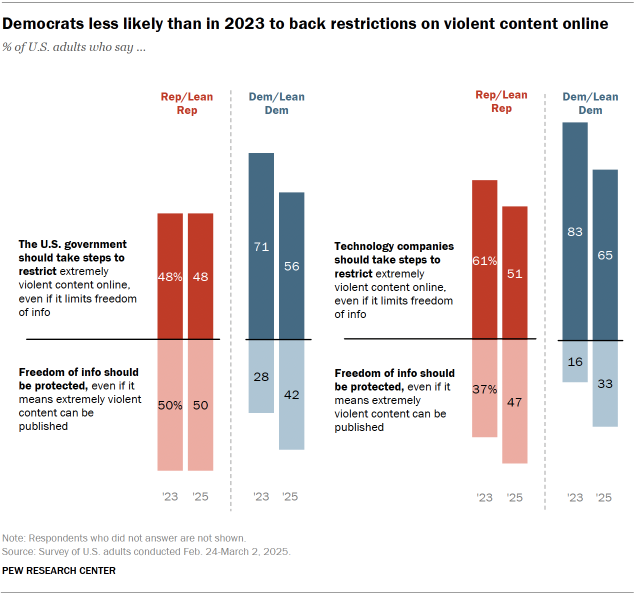Public support for the U.S. government or tech companies taking steps to restrict false information online has ticked down slightly since 2023 after increasing in the years prior.
Support has also decreased for the government or tech companies taking steps to restrict violent content online, according to a new Pew Research Center survey.
Today, about half of Americans (51%) say the U.S. government should take steps to restrict false information online, even if it limits freedom of information. This is down from 55% in 2023.
By comparison, a higher share of Americans (60%) say tech companies should take steps to restrict false information online. This, too, is down from 65% two years ago.
Public attitudes have changed in a more pronounced way when it comes to violent content online. Compared with 2023, fewer Americans now support the government or tech companies taking steps to restrict this type of content, while higher shares say freedom of information should be protected, even if it means extremely violent content can be published. Jump to this section of the analysis to read more.
The survey was conducted from Feb. 24 to March 2, 2025, after Meta – the parent company of Facebook and Instagram – announced it would end its fact-checking program, and after President Donald Trump signed an executive order on Jan. 20 titled “Restoring Freedom of Speech and Ending Federal Censorship.”
More recently, some lawmakers in Congress are pushing to repeal Section 230, a law that shields social media companies from being held liable for speech that is posted on their sites by individual users.
Views of government restrictions, by party

Democrats and Democratic-leaning independents are more likely than Republicans and Republican leaners to support government restrictions on false information online, but the gap has narrowed since 2023.
In the new survey, 58% of Democrats express support for such restrictions, down from 70% two years prior.
Meanwhile, the share of Republicans who say the U.S. government should take steps to restrict false information online has remained relatively stable (39% in 2023, 43% today). More than half of Republicans (55%) continue to say freedom of information should be protected, even if it means false information can be published.
In four Pew Research Center surveys conducted since 2018, Democrats’ support for government restrictions on false information online has been highest when Joe Biden was president (in 2021 and 2023) and lowest when Trump has been in office (in 2018 and 2025).
Republicans’ views have been steadier since 2018. But GOP support for government restrictions on false information fell after Biden took office in 2021.
Views of tech companies’ restrictions, by party
Around three-quarters of Democrats (73%) currently say technology companies should take steps to restrict false information online, even if it limits freedom of information. This is down from 81% in 2023.
Just under half of Republicans (47%) say the same, virtually identical to 2023.

Declining public support for restrictions on extremely violent content online

Americans are now less likely than in 2023 to say the U.S. government or technology companies should take steps to restrict extremely violent content online, even if it limits freedom of information.
In the new survey, about half of U.S. adults (52%) support the government taking these steps, down from 60% in 2023, the first year we asked this question. And 58% say tech companies should take action to restrict extremely violent content on their platforms, a decline from 71% two years ago.
Views by party
Democrats are more supportive than Republicans of restrictions on extremely violent content online, but the partisan gap has shrunk significantly. In 2023, 83% of Democrats said technology companies should take steps to restrict extremely violent content online; 65% say this today. And while 71% of Democrats said in 2023 that they supported the government taking these steps, that figure has decreased to 56% in the new survey.
When it comes to the government, 42% of Democrats now say freedom of information should be protected, even if it means extremely violent content can be published.
As was the case in 2023, Republicans remain about evenly divided over whether the U.S. government should take steps to restrict extremely violent content online or whether freedom of information should be protected (48% vs. 50%). Republicans are also closely split on whether tech companies should take steps to restrict this type of content: 51% say they should, while 47% say that freedom of information should be protected. GOP support for tech company restrictions on extremely violent content is down from 61% in 2023.

Note: Here are the questions used for this analysis, along with responses, and its methodology.




